
Interviews with People Inspired by Oz
Hosted by The Daily Ozmapolitan

American Fairy Tales
A Conversation with Gregory Maguire
 Gregory Maguire is the author of WICKED:
THE LIFE AND TIMES OF THE WICKED WITCH OF THE WEST, which in turn became one of the most
popular Broadway musicals of all time. His works include novels
for children and adults, as well as several short stories. He is
always at work on a new project, and is currently wrapping up the final
volume in the Wicked series. I began by asking him what social
influences have found their way into his writing over the last 30
years...
Gregory Maguire is the author of WICKED:
THE LIFE AND TIMES OF THE WICKED WITCH OF THE WEST, which in turn became one of the most
popular Broadway musicals of all time. His works include novels
for children and adults, as well as several short stories. He is
always at work on a new project, and is currently wrapping up the final
volume in the Wicked series. I began by asking him what social
influences have found their way into his writing over the last 30
years...
GM: Since I was born in 1954, that makes me a right-in-the-middle-of-it baby boomer.
 It means that I was about five when THE WIZARD OF OZ
began to be a regular feature on network television, and I was almost
16 when National Guardsmen shot students at Kent State University
protesting America's involvement in Vietnam. So I would argue that my
childhood began with LEAVE IT TO BEAVER and ended with Watergate--the
portrait of a social education. (I don't know if LEAVE IT TO BEAVER is
a familiar reference: it was an anodyne family show celebrating the
peace and prosperity of America in the 50's. ) I think, to sum up, my
childhood can be understood in terms of the lapel button that became
popular at that time: QUESTION AUTHORITY. Though maybe coming to
embrace that suggestion is the aim of all childhoods, and what makes
maturity, in the final analysis, is maturity.
It means that I was about five when THE WIZARD OF OZ
began to be a regular feature on network television, and I was almost
16 when National Guardsmen shot students at Kent State University
protesting America's involvement in Vietnam. So I would argue that my
childhood began with LEAVE IT TO BEAVER and ended with Watergate--the
portrait of a social education. (I don't know if LEAVE IT TO BEAVER is
a familiar reference: it was an anodyne family show celebrating the
peace and prosperity of America in the 50's. ) I think, to sum up, my
childhood can be understood in terms of the lapel button that became
popular at that time: QUESTION AUTHORITY. Though maybe coming to
embrace that suggestion is the aim of all childhoods, and what makes
maturity, in the final analysis, is maturity. WW: L. Frank Baum said in his introduction to THE WONDERFUL WIZRD OF OZ that "the time has come for a series of newer "wonder tales" in which the stereotyped genie, dwarf and fairy are eliminated, together with all the horrible and blood-curdling incidents devised by their authors to point a fearsome moral to each tale." Having lived in the U.K. and Ireland, is there a difference between how Europeans and Americans view fairy tales in general?
GM: I started to answer this but my message (so eloquent)
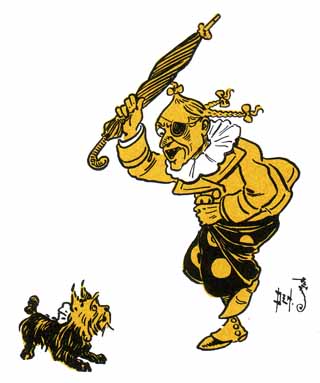 was
lost in cyberspace. The truth is, I
have found that the differences between American and European versions
of the most famous of the tales don't vary much. (Americans are not as
familiar with tales like, say, Dick Whittington and His Cat, or Clever
Gretel, or even Robin Hood, sadly, as those like Cinderella, Snow
White, and Sleeping Beauty.) However, I have always found it
fascinating, and written about this, that in trying to create a new
sort of wonder tale for American children, Baum so successfully created
new heroes, new models of virtue--not just the simple Dorothy, so
clearly modeled after Wonderland's Alice, but the Cowardly Lion, the
Tin Woodman, the living Scarecrow. However, in dealing with plain and
terrifying evil, he resorted to old-fashioned, even old-world ideas of
wickedness--the Wicked Witch in her Castle. Thus, one might deduce,
morally, we can applaud the arrival of a hero from any humble
beginning, but of evil--because the story required evil--we must rely,
even now, even in Baum, on stereotypes. That whole notion that the
stereotype of evil is a shortcut to moral assessment--and thus a
delimiting of the character of the adversary into only one attribute,
wickedness--was where the novel WICKED began.
was
lost in cyberspace. The truth is, I
have found that the differences between American and European versions
of the most famous of the tales don't vary much. (Americans are not as
familiar with tales like, say, Dick Whittington and His Cat, or Clever
Gretel, or even Robin Hood, sadly, as those like Cinderella, Snow
White, and Sleeping Beauty.) However, I have always found it
fascinating, and written about this, that in trying to create a new
sort of wonder tale for American children, Baum so successfully created
new heroes, new models of virtue--not just the simple Dorothy, so
clearly modeled after Wonderland's Alice, but the Cowardly Lion, the
Tin Woodman, the living Scarecrow. However, in dealing with plain and
terrifying evil, he resorted to old-fashioned, even old-world ideas of
wickedness--the Wicked Witch in her Castle. Thus, one might deduce,
morally, we can applaud the arrival of a hero from any humble
beginning, but of evil--because the story required evil--we must rely,
even now, even in Baum, on stereotypes. That whole notion that the
stereotype of evil is a shortcut to moral assessment--and thus a
delimiting of the character of the adversary into only one attribute,
wickedness--was where the novel WICKED began.WW: A common trend lately in Oz books, is what I call "Dark Oz". Where the Pollyannish, neatly wrapped up Oz stories of Baum and Thompson are discarded in favor of a more realistic world which includes violence and sex. What is the dividing line between children's and young adult's literature?
GM: Oh, my dear: this is a question for Ph.D.'s. (Luckily I have a Ph. D.) As a primary villain in the so-called Dark Oz impulse, I know I had to make a choice to use Oz for my very adult concerns. I think the difference between children's books and young adult literature has to do with little more than a mature awareness of the facts of sex and desire, as well as the facts of political power. (Experience is not required, but the basic facts are important.) As to the line between young adult literature and adult literature, well, that line has been obliterated for ten or fifteen years now. (Maybe the publication of WICKED in 1995 was part of its obliteration.)
WW: What do you think it is about Wicked that has touched the zeitgeist of the post 9/11 era?
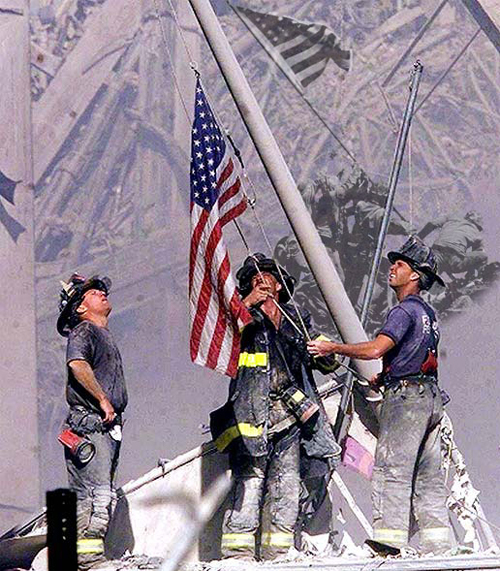
GM: Though WICKED, the musical had been in development for several years before 9/11, I was fairly sure work on it would falter after that horrible attack. Grieving as Americans were, and frightened in a way we'd never been in our own lifetimes, how could we tolerate a story that required of us the suspension of judgment about who was the obvious villain, and that naming villains in itself was a terribly risky business? Still, this is one of the virtues of America (and of western democracies in general, I would add): our better natures reassert themselves almost as a corrective against excess of any kind. And therefore when WICKED opened, it was seen as a critique of American bombast and exceptionalism, of scapegoating and its costs. Nothing could have made me happier, in those woeful days, than that WICKED might have helped redress the balance, in however small a way, of the mistakes that the United States was in danger of making, or was in fact making.
WW: You're working on the fourth and final (I assume) volume in the WICKED series. In hindsight, given the massive popularity of the Broadway stage production, would you go back and change anything from the first volume?

GM: I always knew the play would be different, and I cherish the adumbrations made upon the story I wrote (and upon Baum's story and MGM's popularization of it). Still, I wrote my story with literary aims, and its satisfactions I think are chiefly literary. The one thing I learned from the play that I wish I had thought of myself is very very simple: In the theatrical production's flashback involving the birth of Elphaba, you might notice that the midwife is an Animal. I wish I had thought of that. But then, when I wrote Elphaba's birth in the novel WICKED, I didn't yet know there were going to be talking Animals in the novel.
WW: Are there any contemporary authors that you feel a literary kinship with? J.K. Rowling, Philip Pullman to throw a few names out there.
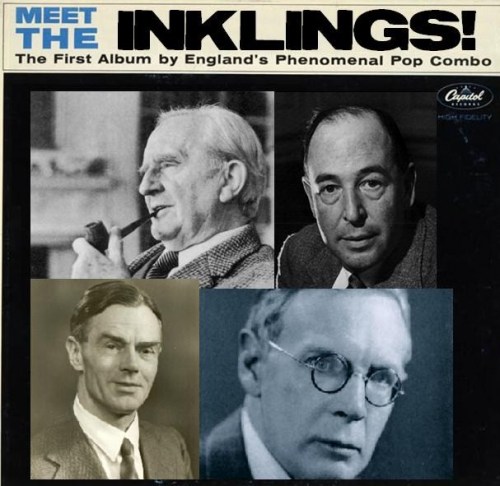 GM: Well, I've met
both Jo
Rowling (at Harvard) and Philip Pullman (through various friends).
Indeed, Philip and his wife attended the opening of WICKED in London as
my guest. And in a sense I do feel a kinship with them, but also with
writers of the generation previous (who are still alive and working):
Susan Cooper and Ursula Le Guin. I think Neil Gaiman and Salman
Rushdie, both of whom are distant friends of mine, share something of
my vices. And among the Great and the Good of the past, I would hope
that were I ever allowed into the Inklings Club in heaven, or the
Algonquin Club, or whatever it may be called, I might be able to spend
a few minutes in the company of Tolkien, C. S. Lewis, and T. H. White.
I wouldn't speak to them, and I wouldn't even dare to look up into the
faces of George MacDonald, J. M. Barrie, Lewis Carroll, or E. Nesbit.
But I hope I would be allowed over the threshold of the Club to be
allowed to stand in the same space for a few moments.
GM: Well, I've met
both Jo
Rowling (at Harvard) and Philip Pullman (through various friends).
Indeed, Philip and his wife attended the opening of WICKED in London as
my guest. And in a sense I do feel a kinship with them, but also with
writers of the generation previous (who are still alive and working):
Susan Cooper and Ursula Le Guin. I think Neil Gaiman and Salman
Rushdie, both of whom are distant friends of mine, share something of
my vices. And among the Great and the Good of the past, I would hope
that were I ever allowed into the Inklings Club in heaven, or the
Algonquin Club, or whatever it may be called, I might be able to spend
a few minutes in the company of Tolkien, C. S. Lewis, and T. H. White.
I wouldn't speak to them, and I wouldn't even dare to look up into the
faces of George MacDonald, J. M. Barrie, Lewis Carroll, or E. Nesbit.
But I hope I would be allowed over the threshold of the Club to be
allowed to stand in the same space for a few moments. (I would offer to take coats and circulate the cheese and biscuits.)
WW: I'm sure you've met some interesting Oz fans in the past 15 years. Tell us about a few of the more memorable people and experiences you've had.
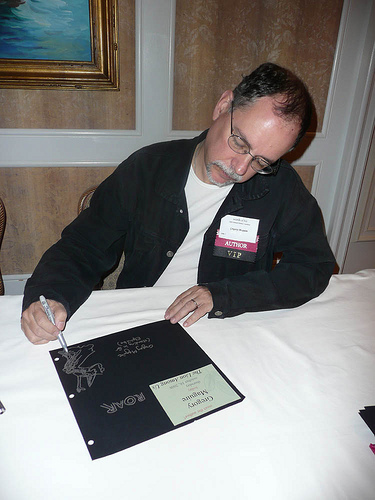 GM: I have met one of the
original Munchkins, who came to hear me speak in Kansas City, no less
(though I think it was Kansas City, Missouri). Early on, before WICKED
had quite been fully optioned for Broadway, Stephen Schwartz came to
hear me read from CONFESSIONS OF AN UGLY STEPSISTER at a Manhattan
bookstore. But the most wonderful by far are the fans who approach and
tell me a small shred of their personal stories. So many people have
suffered in illness and bad luck. How many people can you believe
grabbed WICKED to take with them as they were fleeing Hurricane
Katrina? I have autographed books that were swollen from having been
water-logged to nearly twice their normal size. I have heard from women
in book groups who have said that reading WICKED together while one of
their number was going through breast cancer treatments was the most
palliative and consoling thing they could imagine. One reader told me
she had had a brain injury and her father sat by her hospital bed while
she was not expected to live and read WICKED to her from start to
finish, to keep her focussed and alert. Another person told me he
had
driven four hundred miles to hear me read in a bookstore and after a
cup of coffee he was going to start home--the same night. The rewards
of such attentive readers are beyond description.
GM: I have met one of the
original Munchkins, who came to hear me speak in Kansas City, no less
(though I think it was Kansas City, Missouri). Early on, before WICKED
had quite been fully optioned for Broadway, Stephen Schwartz came to
hear me read from CONFESSIONS OF AN UGLY STEPSISTER at a Manhattan
bookstore. But the most wonderful by far are the fans who approach and
tell me a small shred of their personal stories. So many people have
suffered in illness and bad luck. How many people can you believe
grabbed WICKED to take with them as they were fleeing Hurricane
Katrina? I have autographed books that were swollen from having been
water-logged to nearly twice their normal size. I have heard from women
in book groups who have said that reading WICKED together while one of
their number was going through breast cancer treatments was the most
palliative and consoling thing they could imagine. One reader told me
she had had a brain injury and her father sat by her hospital bed while
she was not expected to live and read WICKED to her from start to
finish, to keep her focussed and alert. Another person told me he
had
driven four hundred miles to hear me read in a bookstore and after a
cup of coffee he was going to start home--the same night. The rewards
of such attentive readers are beyond description.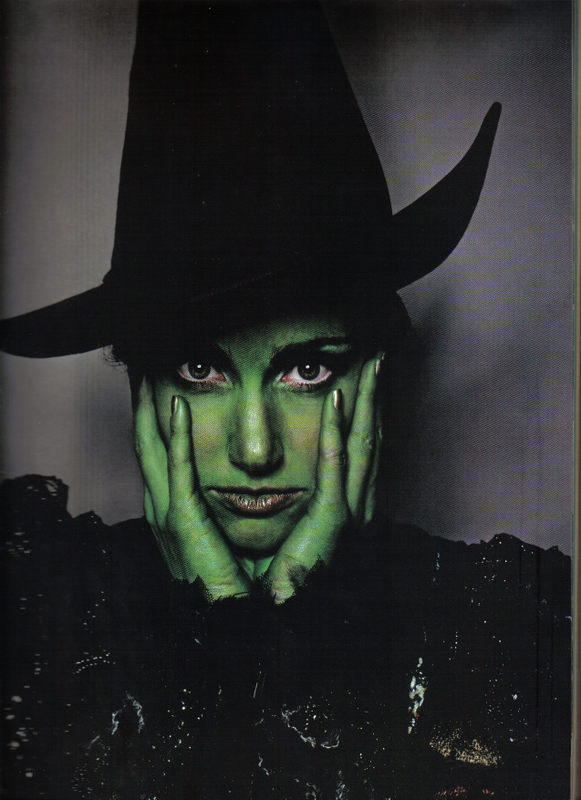 WW: What
is the number one question
you get asked by fans when you do appearances and book readings?
WW: What
is the number one question
you get asked by fans when you do appearances and book readings?GM: Is Elphaba (pictured at right) still alive?
WW: Oz as a film property is certainly alive. There seems to be a huge surge of interest in Hollywood for developing new films about Oz within the last year. There are several in development already. Would you be interested in seeing Wicked made into feature length non-musical film?
GM: I would indeed, and there has been some thought that WICKED might end up both as a film musical based on the blockbusting play and perhaps, in another life, as a dramatic film or TV miniseries. I say, the more the merrier.
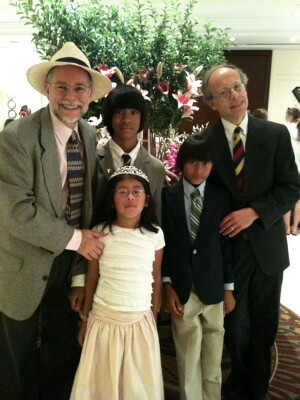 WW: Speaking
of the more
the merrier, you and your partner have adopted three children (pictured at left).
Has the experience of raising them affected how you write (other than
the obvious time and space issues)? Have you gained some ability
to see the world through your children's eyes?
WW: Speaking
of the more
the merrier, you and your partner have adopted three children (pictured at left).
Has the experience of raising them affected how you write (other than
the obvious time and space issues)? Have you gained some ability
to see the world through your children's eyes?GM: If I were to think of my children as being investments in enlarging my capacity to understand children, and therefore to write more persuasively and coherently for them, I would conclude that the adoption of my children was a bad investment and I'd mail them all back. Luckily that isn't why I and my husband adopted them. (Yes, in Massachusetts the concept of a man's husband isn't a coy pretense but a legal reality.) However, I suspect once the children are grown and gone out of my home and I no longer have the emergency-responder's-obligations of triage, soothing every bruised feeling and trying to control incipient poor behavior, etc., I may find I have, inadvertently and after it was useful, learned more about the young than I was able to take in at the time. (Most parents do, I think, which is why the human race tends to do slightly better at being grandparents than parents.)
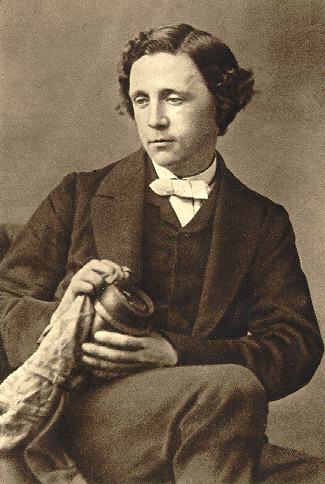
WW: You were a former professor of children's literature and an advocate for literacy. What place do you feel that the Brothers Grimm, Lewis Carroll's (pictured at right) and L. Frank Baum's writings hold in today's post-modern world?
GM: For adults, there is such a thing as post-modernism. For children, there is only modernism--the here, the now. Learning that the fairy tales, for instance, were largely maintained by an oral tradition and not collected until the eighteenth and nineteenth centuries, is a very adult understanding. Kids don't know about what happened the year before they were born, much less what several centuries ago means.
Because of this peculiar limitation in children's understandings of time and culture, the fairy tales remain always news, always new. And so do the works of great nonsense fantasists Lewis Carroll and L. Frank Baum. That Dorothy doesn't instant-message her Best Friends Forever back in Kansas while her house is elevated by a tornado offers no confusion to young readers. They take each story, and all its parameters, as mysterious givens. So did we, in our time and place as children.

WW: What work of yours are you most proud of and why?
GM: Most recently I have been working on OUT OF OZ, the fourth and (I believe) final book in the WICKED YEARS sequence. So of course it is the most interesting to me right now. But in the past several years I have done three books all of which break the mold for me. THE NEXT QUEEN OF HEAVEN is a comic novel set in upstate New York at the turn of the last millennium, and as a bit of light realistic fiction it doesn't rely on fantasy for any of its movement or significance. MAKING MISCHIEF: A MAURICE SENDAK APPRECIATION is a critical essay, lavishly produced and illustrated with the works of this personal friend and muse. And MATCHLESS is a retelling of Hans Christian Andersen's "The Little Match Girl" with--if you can believe it--several dozen of my own line drawings.
WW: I also understand that you have written several songs. As a fellow guitar player, is there a sense of lyrical narrative in your works?
GM: Oh, I have a whole lot of ego, bombast-dimensions. I could parade my ego on strings past Macy's on Thanksgiving Day and it would fit right in. I'm a member of Bloviators Unanonymous. But even I think I would resist inflicting my songs on an unwitting public.
WW: Any chance that you might release a CD of your songs someday?
GM: Well, some of them were very good, I have to admit. Others were not. The problem is I can't tell the difference.
WW: Lastly, if there is an overarching meta-narrative to your works, how would you sum it up?
GM: This is a great question and I am not sure I can answer it. I suppose I am possessed by the novelist's quite ordinary affection for the marginalized, the disenchanted. Elphaba, in WICKED, is only the most obvious iteration of that affection, but all of my work champions the weak and the lowly against the mighty and high. (But most of fiction does too: that's what fiction DOES.
 Even the word "novel"
suggests that "the novelty
of everyone's individual life, no matter how small and crabbed or
misguided and sorrowful, is legitimately worthy of our attention." It's
a large egalitarian statement. ) So, trying to be a little bit more
specific, I might say that in my books there is a central place for the
imagination and for the enlargement of sympathies that imagination
sometimes fosters. I use magic as a metaphor for the power of the
imagination to change life as we see it: to make it into something
better. As I put it in my children's novel, WHAT-THE-DICKENS, when the
boss of the tooth fairies is explaining to a novice why children love
to wish on a birthday candle, "Wishing is the beginning of imagination.
Children practice wishing when they are young things, and then--when
they have grown--they have a developed imagination. Which can do some
harm--greed, that kind of thing--but more often does them so good. They
can imagine that things might be different. Might be other than they
seem. Could be better."
Even the word "novel"
suggests that "the novelty
of everyone's individual life, no matter how small and crabbed or
misguided and sorrowful, is legitimately worthy of our attention." It's
a large egalitarian statement. ) So, trying to be a little bit more
specific, I might say that in my books there is a central place for the
imagination and for the enlargement of sympathies that imagination
sometimes fosters. I use magic as a metaphor for the power of the
imagination to change life as we see it: to make it into something
better. As I put it in my children's novel, WHAT-THE-DICKENS, when the
boss of the tooth fairies is explaining to a novice why children love
to wish on a birthday candle, "Wishing is the beginning of imagination.
Children practice wishing when they are young things, and then--when
they have grown--they have a developed imagination. Which can do some
harm--greed, that kind of thing--but more often does them so good. They
can imagine that things might be different. Might be other than they
seem. Could be better." That's what I wish for every day--when I write, when I dream, when I wake up. That I might be able to imagine how things could be better. Then it becomes my job to help make it so, in whatever way I can manage or imagine. ∆
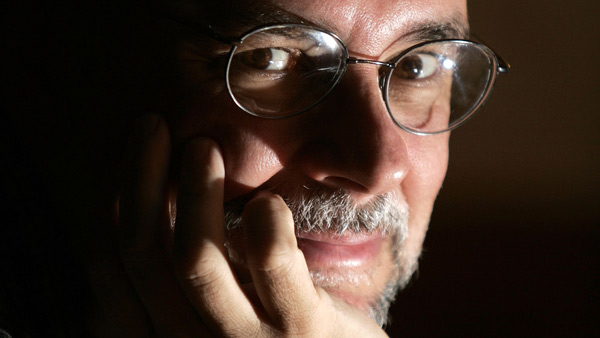 Gregory Maguire received his Ph.D. in
English and American Literature from Tufts University, and his B.A. from the State University of New York at
Albany. He
was a professor and co-director at the Simmons College Center for the
Study of Children's Literature from 1979-1985. The bestselling author of CONFESSIONS OF
AN UGLY STEPSISTER, LOST, MIRROR MIRROR, and the WICKED YEARS, a series
that includes WICKED, SON OF A WITCH, and A LION AMONG MEN. Maguire has
lectured on art, literature, and culture both at home and abroad. He has three adopted children and
is married to painter Andy Newman. He lives with his family near
Boston, Massachusetts.
Gregory Maguire received his Ph.D. in
English and American Literature from Tufts University, and his B.A. from the State University of New York at
Albany. He
was a professor and co-director at the Simmons College Center for the
Study of Children's Literature from 1979-1985. The bestselling author of CONFESSIONS OF
AN UGLY STEPSISTER, LOST, MIRROR MIRROR, and the WICKED YEARS, a series
that includes WICKED, SON OF A WITCH, and A LION AMONG MEN. Maguire has
lectured on art, literature, and culture both at home and abroad. He has three adopted children and
is married to painter Andy Newman. He lives with his family near
Boston, Massachusetts.
Several of his works have just been
republished in paperback by Harper including the one with his line
drawings (MATCHLESS).
Mr. Maguire's Website
is here
His latest
novel is entitled "THE NEXT QUEEN OF HEAVEN"
which you can order along with many other of his works here
Blair Frodelius lives in
upstate New York and is the
editor of:
The
Daily
Ozmapolitan, OzProject.com,
and The International Wizard of Oz Club's Ozmapolitan Express
He can be
reached at blair@frodelius.com

